Editorial: The new Services - Can Apple Arcade fuel iPhone growth in a slowing smartphone ...
Apple Arcade and related Services are intended to fuel sales of new hardware by attracting new customers and prompting upgrades. But is it realistic to expect that Apple can drive sales growth for iPhone as overall smartphone growth stalls or even contracts globally? Pundits like to say that iPhone "is over" and that Apple has to run out and discover a new hit product. But they're wrong, here's why.
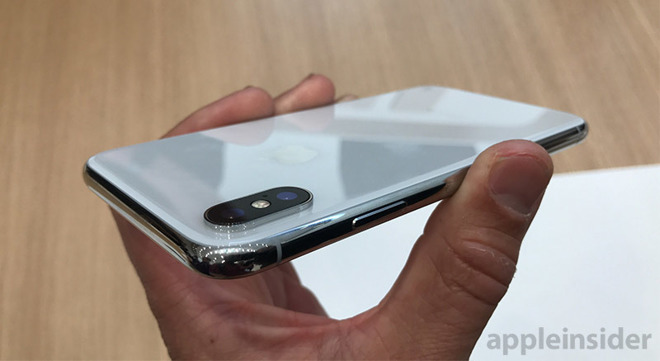
What hope is there for iPhone growth?
Compare that to Samsung, which not only didn't detail how many phones it sold, but also didn't offer any insight into the revenue trajectory of its smartphones-- particularly premium models that earn virtually all of its profits-- independent from the rest of its Mobile IM unit.
China's Huawei is privately held, so it doesn't have to report anything, and doesn't. [correction: Huawei does issue Annual Reports and PR statements, some of which had included phone shipments but not revenues, or revenues for all Consumer Business revenues without phone business detail].
Even Google refused to offer any insight into its Pixel hardware business, apart from offhandedly admitting that in its third year, Pixel 3 actually performed worse than the absolutely dismal performance of the first two years. No unit numbers, no revenues, and still no flack from the same analysts who insisted that it's Apple hiding the reality of its supposedly bleak future in phones.
Apple actually stated that iPhone sales were already showing signs of recovery in the March quarter. It helped that China dropped its Value Added Tax applied to purchases like iPhones in an effort to boost its economy. Apple also said it lowered prices in emerging markets to offset unfavorable exchange rates and expanded its trade-in programs, and both efforts saw results. In its April 30th earnings call, Apple's chief executive Tim Cook stated, "we like the direction we're headed with iPhone, and our goal now is to pick up the pace."
Cook noted "our active installed base of devices continues to grow in each of our geographic segments, and set a new all-time record for all major product categories," then launched into an outline of Services. In fact, Services dominated most of Cook's prepared comments on the state of Apple and iPhone specifically. It seems pretty clear that Apple sees Services as a way to strengthen its hardware business, rather than just being its last-ditch effort to wring some additional revenues from the smoldering remains of its dead iPhone dinosaur.
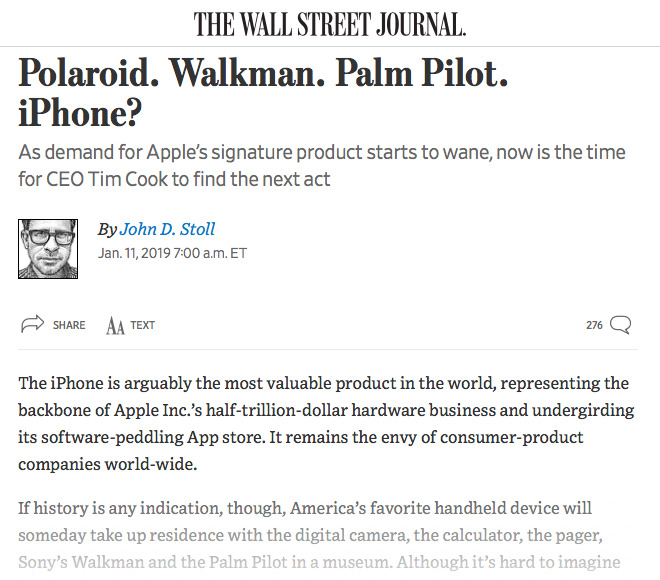
A newspaper is offering Apple advice on how to remain relevant and stay in business
Within this year, Apple Arcade, News+, TV+ and the new Apple Card will ship tangible deliverables based on monumental, expensive work involving major global partnerships with actors, artists, photographers, magazine publishers, major newspapers, games and movie studios-- all with the intent to line up new content and features associated with Apple hardware.
In response, media personalities yawned and walked out shaking their heads as they made their way to their keyboards to type out how confused and upset they were about the whole thing.
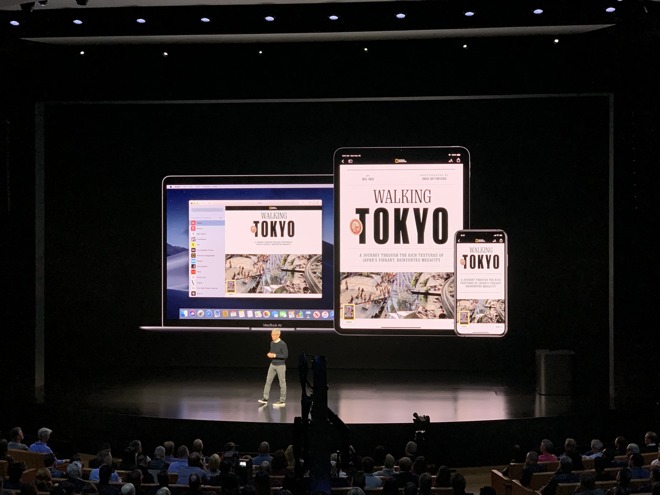
Apple's hardware-free presentation was actually all about its hardware
It's not new for Apple's work to be unappreciated by the people who have positioned themselves as the judges of what the company does. They usually don't get it. But hindsight tells us that Apple has been incredibly prescient at knowing what to invest in to launch and then maintain the success of its products.
The combined efforts of the rest of the tech industry, including the tech giant that effectively monopolized computing under Windows, the endlessly praised geniuses that organized all of the world's information for search, and every big phone maker that ever existed-- towering brands from Motorola to Nokia to Sony Ericsson-- each did their best to defeat iPhone with something else but couldn't even slow Apple down.
Will Apple's iPhone pace ever just run out of breath-- or perhaps out of customers-- and settle down in history as another generational mega brand of a past era like Polaroid, Atari or Sony?
Apple not only launched its own smartphone, but also later addressed the market for portable, wearable music in a new strategy. Nobody predicted the outcome: Apple effectively replaced its iPods selling for $129 with Apple Watch, selling at around $300, outfitted with bands that can cost more than an iPod, and tethered wirelessly to $160 AirPods.
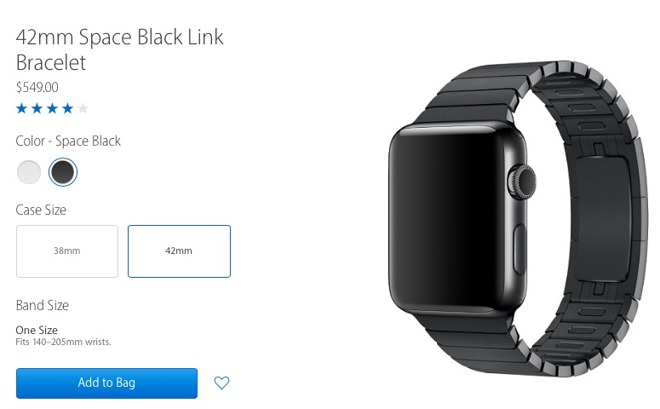
Apple sells bands that cost more than a Mac mini
This not only dramatically expanded how much Apple earned from each customer, but also expanded iPod into a much larger market. Apple found entirely new classes of customers for a product category others had left for dead.
In the minds of people who desperately want Apple to fail, the story was that iPods trailed off into nothing and Apple Watch is just a niche business that's not nearly as big as iPhones. That is, quite incredibly, the basic take offered by major financial news sources, from Bloomberg to the Wall Street Journal to CNBC. But they have lied about Apple's position in the industry so much that they are blinded by the length of their Pinocchio noses.
In what could be seen as a foreshadowing harbinger, Apple stopped reporting iPod unit sales in fiscal 2015 when Apple Watch went on sale. This was commonly interpreted at the time as being a humbling admission of defeat for iPods.
The fact that unit sales of Apple Watch were also not going to be reported was also spun as a cowardly lack of faith in the new product, grounded in the reality that it had no chance of ever becoming another hit on the level of Steve Jobs' revolutionary, iconic iPod-- a product so powerful it usurped the role of Sony's once legendary Walkman while lethally striking down every new challenger, from Microsoft's Zune to Samsung's Galaxy Player.
However, in 2015 Apple's iPod-centric "Other Hardware" category was shrinking by 17 percent. By 2017 it was growing by 20 percent annually. "Other Hardware" is now named "Wearables, Home and Accessories." It includes Apple Watch, AirPods, and HomePod, and this quarter reported growth of 30%. Sales of wearables specifically grew by 50%.
The historical pinnacle of Apple's FQ2 iPod sales reached around $1.8 billion in revenues in 2008, yet today Apple is selling $5.1 billion worth of music-oriented hardware wearables and "Pod" accessories.
The drivers of this huge expansion included developing entirely new technologies for expanding product sophistication, finding new use cases to reach new audiences of buyers, and incrementally expanding the components of a composite solution aimed at the "job to do."
If you take apart the components of Apple's strategy and compare each new element to the combined output of the rest of the world, it's easy to portray Apple's early steps as insignificant failures. That is, in fact, exactly what IDC and various other market research companies did in their mocking, condescending reports targeting the world's most successful non-phone, non-computing device in electronics-- first with iPod and then with Apple Watch.
This was also likely one reason why Apple stopped reporting unit sales of its music devices back in 2015. The market opportunity Apple was interested in reaching was not "devices named iPod," but rather personal and wearable electronics. The unit sales of individual products were not important to understanding what Apple was doing, but would rather simply be a distraction.
Analysts obsessed with unit sales tried to figure out where Apple and the industry were headed by comparing iPod unit sales to Microsoft's Zune, or "devices capable of playing MP3s," and were later fixated on Apple Watch unit sales estimates in comparison with $13 Xiaomi exercise bands. But all of that carefully charted out numerology busywork failed to predict where things would be today in 2019.
Apple's combined "non-phone nor computing" hardware segment revenue has presented a much clearer picture of how well Apple has executed in the personal electronics market outside of iPhones, Macs, and iPads over the decade, where Apple Watch progressed from concept from global phenomenon. Cook remarked that "this business is now about the size of a Fortune 200 company, an amazing statistic when you consider it's only been four years since we delivered the very first Apple Watch."
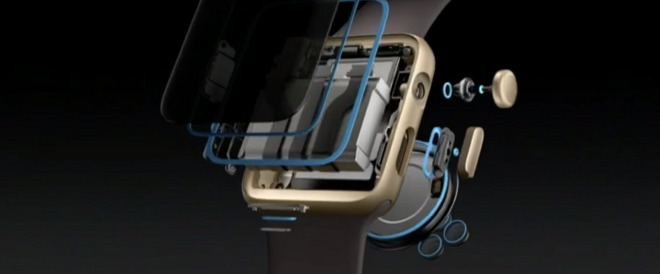
Apple Watch seals developed to achieve water intrusion resistance accelerated iPhone advancement
But rather than being an expensive money pit of pure research like Apple's 1990s Advanced Technology Group think tank, its wearables business is not only self-funding but profitable.
And above that, it's attracting new buyers. Apple's chief financial officer Luca Maestri noted in the most recent earnings call that Apple Watch is "reaching many new customers, with three-quarters of purchases going to customers who have never owned an Apple Watch before."
Because Apple Watch requires an iPhone, all of those new buyers have another reason to also keep upgrading to new iPhones rather than an commodity alternative phone. And on the flip side, all the producers of commodity alternative phones are struggling to fund their own innovations without a similarly profitable innovation engine that attracts new buyers, links them into a ecosystem, funds the development of future technologies and processes, and casts a luxurious halo over their own product lineup.
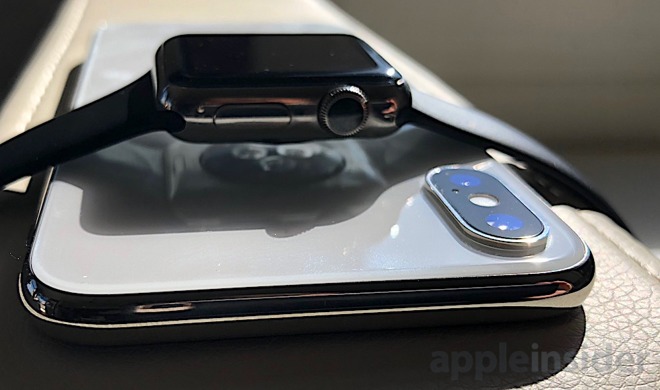
Apple Watch casts a luxurious, sticky halo over iPhone
With all that in mind, how accurate can the future outlook of analysts and industry pundits be today when they compare their wild guesses at estimated iPhone unit sales to $200 commodity Androids while imaging that the future is probably best represented by $2,000 folding prototypes which can claim compatibility with nonexistent 5G networks, built by a company with a solid decade of failure in selling premium phones in commercially relevant volumes?
If Apple could resurrect and resume growth in a category that appeared to be as "over and done" as its 2011 iPod segment, perhaps it can also do this with iPhones. But wait, there's more where that came from.
Over the March quarter, iPad revenue jumped to $4.9 billion from $4 billion in the year-ago quarter. That's an increase almost as large as Apple adding the entire business of Microsoft's Surface unit within the last year.
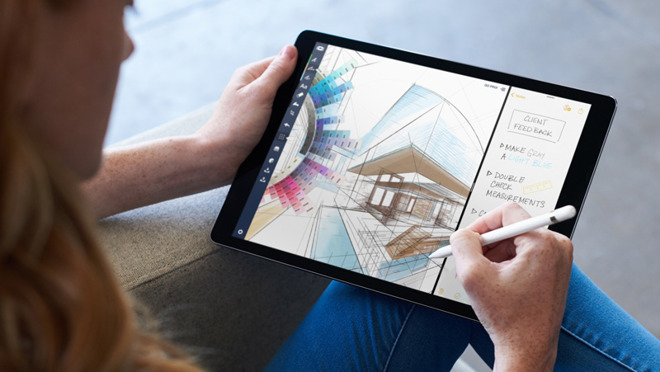
New iPad Pro models helped expand Apple's tablet growth
Microsoft hasn't duplicated its Surface sales in a decade of trying. It's been stuck around a $1 billion ceiling every quarter since it entered the market back in 2013. Despite being awarded many participation trophies, Surface hasn't materially grown in seven years of trying. It wasn't able to assist Microsoft's parallel businesses like Windows Phone, and certainly hasn't offset the plummeting losses of Windows licensing. Microsoft doesn't even describe Surface as being very profitable.
To be fair, this quarter Microsoft's Surface sales did grow annually by nearly the same percentage as Apple's iPad. But Apple's sales were also so large that Apple's 22.5 percent growth in iPad sales represented an additional $900 million, while Microsoft's "impressive increase of 21%" represented just $239 million in additional Surface sales. In the same business climate, why is iPad attracting nearly four times as much new business as Surface, and turning in results nearly five times as great?
Seven years ago you could plausibly make excuses for Microsoft being new to hardware, boldly out of its element, and simply needing some time to get established. But within seven years, Apple went from beleaguered underdog to Mac OS X superstar. In that same span, it launched iPod and established it as a world-changing new device business. In seven years it launched iPhone and rode it to global leadership in an industry Apple had no real experience in. And Apple launched iPad, and became the world's sole successful tablet maker by far, in the seven years that followed a decade of Microsoft desperately trying to develop and market a Tablet PC that consumers or businesses might want.
The above story of Apple Watch trouncing the world's smartwatches and also Switzerland and Rolex has occurred well within seven years. Yet Microsoft's Surface is still trying to find itself, with no shortage of excuses and grandiose praise laid on a massive corporation that's been given a valuation higher than Apple. Why is Microsoft graded on a curve?
Why isn't anyone demanding a groveling apology from Microsoft, of the type bloggers insist on from Apple when it's discovered that a strong man can bend an iPhone with his hands, or that an ultralight notebook keyboard can stick when it's exposed to food and dirt, or when the company lays out a product that it later decides not to ever ship?
It's not merely a plausible concept. That's exactly what Apple spoon-fed to the media at its March Event. Services are aimed at pulling in new hardware buyers.

New Services including Apple Arcade are aimed at pulling in new hardware buyers
Apple just reported that half of its iPad buyers over the last quarter were new to the platform, meaning that the company isn't just servicing a finite, stagnant base of customers with annual replacements, but is materially increasing the size of its installed base of devices in use while also expanding its base of users.
The best way to ensure that iPhone and iPad keep outgrowing other platforms is to make sure that they get exclusive, desirable applications. Apple Arcade targets that objective and presses the fire button.
Once again, rather than replacing its hardware business, Apple's Services are pretty clearly aimed at strengthening the ecosystem that keeps Apple's premium hardware sales so remarkably stable, even in the face of ostensibly specification-adequate commodity Androids priced around a third or less the average selling price of iPhones.
The result of Apple's solid growth in its hardware users' installed base is particularly evident when compared to the churn among various Android commodity makers who take turns surging in unit shipments before collapsing behind whoever is cheapest next year. These victims of profitless boom and bust cycles are applauded by market research groups, analysts and pundits, but their "victories" are effectively worthless.
Samsung desperately worked over most of the last decade to establish itself as the leading Android vendor in China in terms of units shipped, only to be thrown to the curb by Huawei, which now holds the dubious honor of being the maker of the most profitless smartphone shipments in the world's largest market.
It's noteworthy and important that Apple is pursuing high-quality premium Services rather than copying various Android licensees' strategy of striving to blow out huge volumes of cheap low and middle tier phones in vast numbers. It's also useful to demystify what "Services" represent: its "software," the seller of systems. That poses the question: can Apple Arcade level up gaming on Macs and Apple TV?

What hope is there for iPhone growth?
"Our goal now is to pick up the pace"
Apple stopped reporting its hardware unit sales six months ago, which critics assumed meant that it wanted to hide bad news, and specifically wanted to obscure the idea that iPhone growth was over and done. However, Apple is still reporting its revenues by segment, so it's impossible to really hide "bad news." In the March quarter, iPhone sales were transparently reported as being down 17% over the year-ago quarter.Compare that to Samsung, which not only didn't detail how many phones it sold, but also didn't offer any insight into the revenue trajectory of its smartphones-- particularly premium models that earn virtually all of its profits-- independent from the rest of its Mobile IM unit.
China's Huawei is privately held, so it doesn't have to report anything, and doesn't. [correction: Huawei does issue Annual Reports and PR statements, some of which had included phone shipments but not revenues, or revenues for all Consumer Business revenues without phone business detail].
Even Google refused to offer any insight into its Pixel hardware business, apart from offhandedly admitting that in its third year, Pixel 3 actually performed worse than the absolutely dismal performance of the first two years. No unit numbers, no revenues, and still no flack from the same analysts who insisted that it's Apple hiding the reality of its supposedly bleak future in phones.
Apple actually stated that iPhone sales were already showing signs of recovery in the March quarter. It helped that China dropped its Value Added Tax applied to purchases like iPhones in an effort to boost its economy. Apple also said it lowered prices in emerging markets to offset unfavorable exchange rates and expanded its trade-in programs, and both efforts saw results. In its April 30th earnings call, Apple's chief executive Tim Cook stated, "we like the direction we're headed with iPhone, and our goal now is to pick up the pace."
Cook noted "our active installed base of devices continues to grow in each of our geographic segments, and set a new all-time record for all major product categories," then launched into an outline of Services. In fact, Services dominated most of Cook's prepared comments on the state of Apple and iPhone specifically. It seems pretty clear that Apple sees Services as a way to strengthen its hardware business, rather than just being its last-ditch effort to wring some additional revenues from the smoldering remains of its dead iPhone dinosaur.

A newspaper is offering Apple advice on how to remain relevant and stay in business
What if Apple threw a Services party and nobody came to the correct conclusion?
In March, Apple exclusively dedicated its spring Event to the unveiling of its largest-ever efforts to prime the pump of iPhone sales: a series of new Services initiatives with a composite price tag well in excess of a billion dollars. It's far more than Apple spent in total to acquire NeXT, AuthenTech, and PrimeSense-- defining perhaps the three biggest historical features that drove iPhone sales in the past.Within this year, Apple Arcade, News+, TV+ and the new Apple Card will ship tangible deliverables based on monumental, expensive work involving major global partnerships with actors, artists, photographers, magazine publishers, major newspapers, games and movie studios-- all with the intent to line up new content and features associated with Apple hardware.
In response, media personalities yawned and walked out shaking their heads as they made their way to their keyboards to type out how confused and upset they were about the whole thing.

Apple's hardware-free presentation was actually all about its hardware
It's not new for Apple's work to be unappreciated by the people who have positioned themselves as the judges of what the company does. They usually don't get it. But hindsight tells us that Apple has been incredibly prescient at knowing what to invest in to launch and then maintain the success of its products.
Approaching 13, can anything make iPhone sales grow?
iPhone wasn't just a lucky break that lasted for a few years like Palm Pilots, StarTacs, the LG Chocolate, or SideKicks. We've now witnessed twelve years of Apple remaining on top as larger and more experienced phone industry rivals fell all over themselves with downright clumsy and embarrassing efforts to hold onto their past success or to launch some new idea like phablets, sliders, netbooks, or mini-phones.The combined efforts of the rest of the tech industry, including the tech giant that effectively monopolized computing under Windows, the endlessly praised geniuses that organized all of the world's information for search, and every big phone maker that ever existed-- towering brands from Motorola to Nokia to Sony Ericsson-- each did their best to defeat iPhone with something else but couldn't even slow Apple down.
Will Apple's iPhone pace ever just run out of breath-- or perhaps out of customers-- and settle down in history as another generational mega brand of a past era like Polaroid, Atari or Sony?
The reports of a death that were greatly exaggerated
While many observers today seem to think that iPhone sales will never grow again, everyone also largely agreed that Apple's sales of iPods were over and done back around 2006 because buyers could now play their MP3s on regular phones.Apple not only launched its own smartphone, but also later addressed the market for portable, wearable music in a new strategy. Nobody predicted the outcome: Apple effectively replaced its iPods selling for $129 with Apple Watch, selling at around $300, outfitted with bands that can cost more than an iPod, and tethered wirelessly to $160 AirPods.

Apple sells bands that cost more than a Mac mini
This not only dramatically expanded how much Apple earned from each customer, but also expanded iPod into a much larger market. Apple found entirely new classes of customers for a product category others had left for dead.
In the minds of people who desperately want Apple to fail, the story was that iPods trailed off into nothing and Apple Watch is just a niche business that's not nearly as big as iPhones. That is, quite incredibly, the basic take offered by major financial news sources, from Bloomberg to the Wall Street Journal to CNBC. But they have lied about Apple's position in the industry so much that they are blinded by the length of their Pinocchio noses.
In what could be seen as a foreshadowing harbinger, Apple stopped reporting iPod unit sales in fiscal 2015 when Apple Watch went on sale. This was commonly interpreted at the time as being a humbling admission of defeat for iPods.
The fact that unit sales of Apple Watch were also not going to be reported was also spun as a cowardly lack of faith in the new product, grounded in the reality that it had no chance of ever becoming another hit on the level of Steve Jobs' revolutionary, iconic iPod-- a product so powerful it usurped the role of Sony's once legendary Walkman while lethally striking down every new challenger, from Microsoft's Zune to Samsung's Galaxy Player.
However, in 2015 Apple's iPod-centric "Other Hardware" category was shrinking by 17 percent. By 2017 it was growing by 20 percent annually. "Other Hardware" is now named "Wearables, Home and Accessories." It includes Apple Watch, AirPods, and HomePod, and this quarter reported growth of 30%. Sales of wearables specifically grew by 50%.
The historical pinnacle of Apple's FQ2 iPod sales reached around $1.8 billion in revenues in 2008, yet today Apple is selling $5.1 billion worth of music-oriented hardware wearables and "Pod" accessories.
The drivers of this huge expansion included developing entirely new technologies for expanding product sophistication, finding new use cases to reach new audiences of buyers, and incrementally expanding the components of a composite solution aimed at the "job to do."
If you take apart the components of Apple's strategy and compare each new element to the combined output of the rest of the world, it's easy to portray Apple's early steps as insignificant failures. That is, in fact, exactly what IDC and various other market research companies did in their mocking, condescending reports targeting the world's most successful non-phone, non-computing device in electronics-- first with iPod and then with Apple Watch.
This was also likely one reason why Apple stopped reporting unit sales of its music devices back in 2015. The market opportunity Apple was interested in reaching was not "devices named iPod," but rather personal and wearable electronics. The unit sales of individual products were not important to understanding what Apple was doing, but would rather simply be a distraction.
Analysts obsessed with unit sales tried to figure out where Apple and the industry were headed by comparing iPod unit sales to Microsoft's Zune, or "devices capable of playing MP3s," and were later fixated on Apple Watch unit sales estimates in comparison with $13 Xiaomi exercise bands. But all of that carefully charted out numerology busywork failed to predict where things would be today in 2019.
Apple's combined "non-phone nor computing" hardware segment revenue has presented a much clearer picture of how well Apple has executed in the personal electronics market outside of iPhones, Macs, and iPads over the decade, where Apple Watch progressed from concept from global phenomenon. Cook remarked that "this business is now about the size of a Fortune 200 company, an amazing statistic when you consider it's only been four years since we delivered the very first Apple Watch."
Apple Watch's luxurious, sticky halo that funds new research
Above and beyond being the personal electronics device business that Apple has built and maintained outside of iPhones and computing, its new wearables business driven by Apple Watch and AirPods is also acting as an advanced research group for the company, pioneering the development of technologies including water resistance, wireless charging, the use of advanced materials, and exploring the concepts of optical device pairing, swipe navigation, and passive biometric authentication. Those ideas have since been applied to enhance iPhones.
Apple Watch seals developed to achieve water intrusion resistance accelerated iPhone advancement
But rather than being an expensive money pit of pure research like Apple's 1990s Advanced Technology Group think tank, its wearables business is not only self-funding but profitable.
And above that, it's attracting new buyers. Apple's chief financial officer Luca Maestri noted in the most recent earnings call that Apple Watch is "reaching many new customers, with three-quarters of purchases going to customers who have never owned an Apple Watch before."
Because Apple Watch requires an iPhone, all of those new buyers have another reason to also keep upgrading to new iPhones rather than an commodity alternative phone. And on the flip side, all the producers of commodity alternative phones are struggling to fund their own innovations without a similarly profitable innovation engine that attracts new buyers, links them into a ecosystem, funds the development of future technologies and processes, and casts a luxurious halo over their own product lineup.

Apple Watch casts a luxurious, sticky halo over iPhone
With all that in mind, how accurate can the future outlook of analysts and industry pundits be today when they compare their wild guesses at estimated iPhone unit sales to $200 commodity Androids while imaging that the future is probably best represented by $2,000 folding prototypes which can claim compatibility with nonexistent 5G networks, built by a company with a solid decade of failure in selling premium phones in commercially relevant volumes?
If Apple could resurrect and resume growth in a category that appeared to be as "over and done" as its 2011 iPod segment, perhaps it can also do this with iPhones. But wait, there's more where that came from.
This all happened before, once more
It was also once thought that iPad sales had reached the end of their natural cycle, that nobody wanted tablets anymore, and that iPad was becoming the new iPod. Yet after Apple launched both high-end new iPad Pro models and enhanced and lowered the prices of its entry-level iPad, Apple's tablet line experienced its strongest quarterly revenue growth in six years in Fiscal Q2.Over the March quarter, iPad revenue jumped to $4.9 billion from $4 billion in the year-ago quarter. That's an increase almost as large as Apple adding the entire business of Microsoft's Surface unit within the last year.

New iPad Pro models helped expand Apple's tablet growth
Microsoft hasn't duplicated its Surface sales in a decade of trying. It's been stuck around a $1 billion ceiling every quarter since it entered the market back in 2013. Despite being awarded many participation trophies, Surface hasn't materially grown in seven years of trying. It wasn't able to assist Microsoft's parallel businesses like Windows Phone, and certainly hasn't offset the plummeting losses of Windows licensing. Microsoft doesn't even describe Surface as being very profitable.
To be fair, this quarter Microsoft's Surface sales did grow annually by nearly the same percentage as Apple's iPad. But Apple's sales were also so large that Apple's 22.5 percent growth in iPad sales represented an additional $900 million, while Microsoft's "impressive increase of 21%" represented just $239 million in additional Surface sales. In the same business climate, why is iPad attracting nearly four times as much new business as Surface, and turning in results nearly five times as great?
Seven years ago you could plausibly make excuses for Microsoft being new to hardware, boldly out of its element, and simply needing some time to get established. But within seven years, Apple went from beleaguered underdog to Mac OS X superstar. In that same span, it launched iPod and established it as a world-changing new device business. In seven years it launched iPhone and rode it to global leadership in an industry Apple had no real experience in. And Apple launched iPad, and became the world's sole successful tablet maker by far, in the seven years that followed a decade of Microsoft desperately trying to develop and market a Tablet PC that consumers or businesses might want.
The above story of Apple Watch trouncing the world's smartwatches and also Switzerland and Rolex has occurred well within seven years. Yet Microsoft's Surface is still trying to find itself, with no shortage of excuses and grandiose praise laid on a massive corporation that's been given a valuation higher than Apple. Why is Microsoft graded on a curve?
Why isn't anyone demanding a groveling apology from Microsoft, of the type bloggers insist on from Apple when it's discovered that a strong man can bend an iPhone with his hands, or that an ultralight notebook keyboard can stick when it's exposed to food and dirt, or when the company lays out a product that it later decides not to ever ship?
Users over units
Is it plausible that the company that dramatically turned around the sinking fortunes of iPods, and then corrected the course of iPads-- both representing product categories nobody else has materially done well in-- could now lay out and implement a strategy capable of returning iPhone to growth?It's not merely a plausible concept. That's exactly what Apple spoon-fed to the media at its March Event. Services are aimed at pulling in new hardware buyers.

New Services including Apple Arcade are aimed at pulling in new hardware buyers
Apple just reported that half of its iPad buyers over the last quarter were new to the platform, meaning that the company isn't just servicing a finite, stagnant base of customers with annual replacements, but is materially increasing the size of its installed base of devices in use while also expanding its base of users.
The best way to ensure that iPhone and iPad keep outgrowing other platforms is to make sure that they get exclusive, desirable applications. Apple Arcade targets that objective and presses the fire button.
Once again, rather than replacing its hardware business, Apple's Services are pretty clearly aimed at strengthening the ecosystem that keeps Apple's premium hardware sales so remarkably stable, even in the face of ostensibly specification-adequate commodity Androids priced around a third or less the average selling price of iPhones.
The result of Apple's solid growth in its hardware users' installed base is particularly evident when compared to the churn among various Android commodity makers who take turns surging in unit shipments before collapsing behind whoever is cheapest next year. These victims of profitless boom and bust cycles are applauded by market research groups, analysts and pundits, but their "victories" are effectively worthless.
Samsung desperately worked over most of the last decade to establish itself as the leading Android vendor in China in terms of units shipped, only to be thrown to the curb by Huawei, which now holds the dubious honor of being the maker of the most profitless smartphone shipments in the world's largest market.
It's noteworthy and important that Apple is pursuing high-quality premium Services rather than copying various Android licensees' strategy of striving to blow out huge volumes of cheap low and middle tier phones in vast numbers. It's also useful to demystify what "Services" represent: its "software," the seller of systems. That poses the question: can Apple Arcade level up gaming on Macs and Apple TV?

Comments
More importantly adding mouse Support to the iPad could pull even more new customers to services and lead to more enterprise development. Marzipan + A series Apps + mouse iPad Apps = more enterprise development. WINTEL can go the way of the IBM mainframe. Unfortunately we are only at the start of that transition.
Just adding mouse support to an iPad won't solve many of the usability issues iPads have when workings as a desktop replacement. The experience has to be as good or better than a Mac / Windows notebooks. If that's not the case, people will go back to traditional notebooks.
I don't see iPads replacing traditional desktops in business and enterprises. You have a better price, better keyboard + mouse experience and larger screen from a business PC than an iPad Pro, unless Apple change the complete iPad experience to compete directly with PC's. And I suppose that's a bad thing, considering how they criticize the Surface Pro (toaster / fridge device).
Huawei has reported its phone sales for as long as I can remember and although they haven't been in the handset business for that long, they include the numbers every year in their audited Annual Report.
Of late they have even given half year unit shipments and this year even gave a shipment figure for Q1:
https://www.huawei.com/en/press-events/news/2019/4/huawei-q1-2019-business-results
Edit: I’m thinking Adjusters and Auditors. It will grow as companies see what they can do.